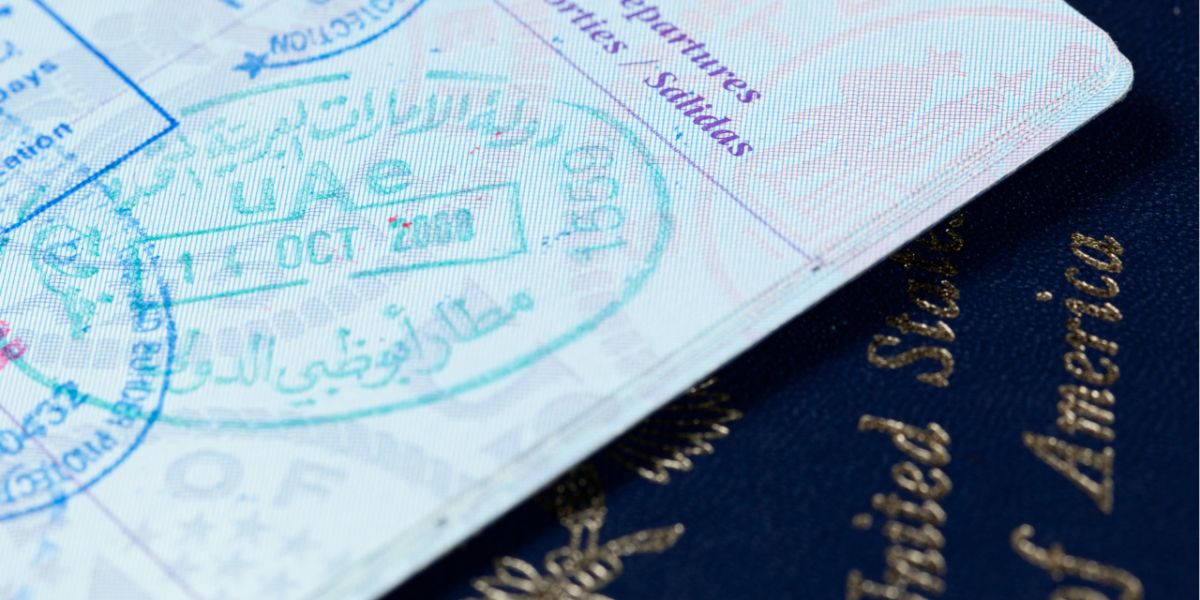
The United Arab Emirates is one of the most popular destinations in the world. Over 16 million people visit it every year, and over 9 million expats call the country home. Offering extensive opportunities for recreation, career development, and investment, the UAE is generally welcoming to visitors, and the country's visa procedures are quite straightforward.
If you plan to visit the UAE or are considering moving to the country for a long period of time, you will need to get fully acquainted with the entry requirements and your visa and residence options for building a life in the UAE. This article offers an overview of the different types of visas and residence permits granted by the UAE.
Traveling to the UAE
Citizens of some countries can travel to the UAE visa-free or get a visa on arrival at no charge.
If you are a citizen of one of the Gulf Cooperation Council (GCC) member countries — the Kingdom of Bahrain, the Kingdom of Saudi Arabia, the Sultanate of Oman, the State of Qatar, or the State of Kuwait — you can travel to the UAE visa-free.
If you are from the following countries, you may obtain a 30-day visit visa on arrival:
- Andorra;
- Australia;
- Brunei;
- Canada;
- Hong Kong;
- Ireland;
- Japan;
- Kazakhstan;
- Malaysia;
- Mauritius;
- Monaco;
- New Zealand;
- People's Republic of China;
- Singapore;
- United Kingdom;
- United States of America;
- Vatican City.
This visa is free of charge and renewable for a similar period.
If you are from the following countries, you may obtain a 90-day multiple entry visit visa valid for 6 months from the date of issue for a stay of 90 days:
- Argentina;
- Austria;
- Bahamas Island;
- Barbados;
- Belarus;
- Belgium;
- Brazil;
- Bulgaria;
- Chile;
- Colombia;
- Costa Rica;
- Croatia;
- Cyprus;
- Czech Republic;
- Denmark;
- El Salvador;
- Estonia;
- Finland;
- France;
- Georgia;
- Germany;
- Greece;
- Honduras;
- Hungary;
- Iceland;
- Italy;
- Kiribati;
- Latvia;
- Liechtenstein;
- Lithuania;
- Luxembourg;
- Maldives;
- Malta;
- Montenegro;
- Nauru;
- Netherlands;
- Norway;
- Paraguay;
- Peru;
- Poland;
- Portugal;
- Romania;
- Russia;
- Saint Vincent and the Grenadines;
- San Marino;
- Serbia;
- Seychelles;
- Slovakia;
- Slovenia;
- Solomon Islands;
- South Korea;
- Spain;
- Sweden;
- Switzerland;
- Uruguay.
Important:
It is illegal to work on a tourist or visit visa in the UAE. To work in the country legally, you will need to obtain a work permit and employment-based residence.
To help you out
Here's our recommended visa service https://expat.click/evisa-guide-uae.
Types of visas for the UAE
Depending on the purpose of your travels to the UAE, you will need to apply for a specific type of visa or residence permit. Below, we will look into the most popular UAE visa types and give tips on getting a residence permit.
You can choose from different types of visas to travel to the United Arab Emirates:
Tourist visa
A tourist visa is one of the most common types. This visa can be used for 30 days or 90 days, with single and multiple entry options. It can be extended up to two times without a need to exit the country.
Student visa
A student visa qualifies an individual to study in the UAE. The student should be over 18 years old and residing in the UAE. Exceptions are available for outstanding students who can get a long-term one for 5 years.
You can find more details about this visa on our Studying in the United Arab Emirates article.
Transit visa
This type of visa is popular among those who have layovers in Dubai or Abu Dhabi. There are two types: a 48-hour visa, which is free of charge, and a 96-hour visa for 50 AED only. The transit visa is sponsored by the passenger's airlines and must be obtained and approved before flying into the country. They cannot be extended.
Patient entry permit
Foreigners can enter the country with their companions for treatment in the UAE. The sponsor is the medical establishment (public and private), and there are two types: a single-entry permit for treatment and a multiple-entry permit for treatment.
Resident visa
Foreigners who are employed in the UAE are eligible for this visa. This is usually applied for by your employer, and is issued along with your work visa.
Green visa
The Green Visa is a residence visa that allows for self-sponsorship. The validity of this visa is 5 years, and it can be renewed for the same amount of time. Green Visas are available for freelancers, self-employed individuals, and skilled employees.
To apply for a Green Visa as a freelancer or self-employed individual, you will need to submit the following:
- A freelance/self-employment permit from the Ministry of Human Resources and Emiratisation (MoHRE);
- Your bachelor's degree (or a specialized diploma);
- Proof that your annual income for the past 2 years has not been less than AED 360,000 (through freelancing/self-employment), or proof that you can financially sustain yourself during your stay in the UAE.
To be eligible for a Green Visa as a skilled employee, you will need to have the following:
- A valid work contract;
- Employment as one of the following professional levels:
- Level 1: Legislators, managers, and business executives,
- Level 2: Professionals in scientific, technical and human fields,
- Level 3: Technicians in scientific, technical and humanitarian fields;
- A bachelor's degree (or its equivalent);
- No less than AED 15,000 in monthly income.
Remote work residence visa
If you've adopted the digital nomad lifestyle and want to make the UAE your next destination, you'll need a remote work residence visa. It will allow you to legally live in the UAE, and have access to all the amenities other residents have. This visa is self-sponsored and holds a validity of one year (which can be renewed). To apply, you will need the following:
- Proof of employment outside of the UAE;
- A minimum monthly income of $3,500.
If you plan to reside in Dubai specifically, the requirements are slightly different. To apply as a freelancer, you will need:
- Proof of employment with a contract valid for at least one year;
- A minimum monthly income of $5,000;
- Salary slips for the past 3 months.
To apply in Dubai as a company owner, you will need:
- Proof of company ownership which has been operating for at least one year;
- A minimum monthly income of $5,000;
- Company bank statement for the past 3 months.
Job seeker visa in the UAE
Those who wish to work in the UAE but haven't had any luck landing a job white outside of the country can now apply for a job seeker visa. This allows you to enter the country and look for a job without the need of a sponsor, and has a validity of either 60, 90, or 120 days. To be eligible for this visa, you will need to meet the following requirements:
- Belong to one of the following professional levels:
- Level 1: Legislators, managers, and business executives,
- Level 2: Professionals in scientific, technical and human fields,
- Level 3: Technicians in scientific, technical and humanitarian fields;
- Or have graduated from one of the top 500 universities in the past 2 years;
- Hold a bachelor's degree (or its equivalent);
- Be able to provide the financial guarantee of AED 1,000.
Visit visa for business opportunities in the UAE
If you're keen to explore investment opportunities in the UAE but are finding it difficult to do so from abroad, you can apply for a visa to enter the country for this purpose. It is a self-sponsored, single-entry visa with a validity of 60, 90, or 120 days. To be eligible, you must meet the following conditions:
- You must be financially solvent, a talent, or a holder of a high qualification;
- You must be a professional in the prospective business in your home country;
- You must be able to provide a financial guarantee of AED 1,000.
Work visas in the UAE
If you are moving to the UAE for work, you will need to apply for a residence visa, which will be connected to your work permit. To apply for a work visa, you will need to present a valid job offer or contract from a company that is based in the UAE.
Work visas in the UAE are granted by the Ministry of Human Resources and Emiratisation (MOHRE) and the General Directorate of Residency and Foreigners Affairs (GDFRA).
The residence visa and work permit are typically granted for a period of one or two years. In most cases, your employer in the UAE will handle the application procedures as well as the related costs. However, before going through the procedures, they will need to make sure that your employment is in line with the foreign worker quotas in their field.
How to apply for a work permit in the UAE?
As mentioned above, work permits in the UAE are granted by the Ministry of Human Resources and Emiratisation (MoHRE) of the United Arab Emirates. If your employment meets all the necessary requirements, your employer will go on to apply for a work permit for you. The work permit that you will then receive will be valid for two months.
After your employment has been approved, you will get an Employment Entry Visa (which is often referred to as the pink visa). In most cases, you will be able to pick up your pink visa at the airport, and it will allow you entry into the UAE and justify your stay for 2 months — during which you will need to complete your residency application process.
When you are in the UAE, your employer will guide you through the rest of the process, which typically involves the following:
- Taking a medical test;
- Receiving an Emirati ID card;
- Receiving a Labor Card;
- Having the employment-based residency permit stamped on your passport.
You will need to go through the above steps within 60 days of your arrival in the UAE.
Good to know:
People suffering from sexually transmitted diseases such as HIV are not eligible to obtain a work permit in the United Arab Emirates, and so are people who will test positive for tuberculosis. An X-ray is required during the medical tests for visa application to screen for this.
Once you have a valid residency permit, you will be able to bring your family to the UAE by becoming their visa sponsor. You will also be able to open a bank account and collect your Emirates ID card within ten days.
When it comes to the costs related to the visa application process, these should be handled by your employer. How much they will need to pay depends on the specifics of your employment.
There are five different skill levels in which employees are classified in the UAE — with level one being the lowest and level five being the highest. The costs related to the visa application process depend on how your position is classified by your employer and the Ministry of Human Resources and Emiratisation. You can find more information on skill level classifications on the official website of the Ministry of Human Resources of the UAE.
In addition to the application costs, your employer will also need to factor in other related fees — medical examination, the fee for obtaining an Emirates ID card, and more.
Once your residence permit approaches its expiration date, your employer will need to apply to renew it. Typically, a grace period of 30 days is granted after your residence expires, which lets you stay in the country and make arrangements to renew your work permit.
If you stay longer than the grace period allows without renewing your residence permit, you will need to pay a fee of 50 AED a day.
Family visa in the UAE
Once you have a valid residence permit in the UAE, you will be able to sponsor visas for your family members to the country. Note that to sponsor a visa for your family member, you will need to earn at least 4,000 AED a month or AED 3,000 plus accommodation.
Your family members will typically be granted visas for 1 to 3 years, depending on the duration of your work contract.
Golden Visa in the UAE
The Golden Visa program lets you apply for long-term residency in the UAE by making an investment in the country's economy. An investment of 2 million AED will allow you to apply for a ten-year residence permit.
The ten-year residence is also open to people of extraordinary talent in specific areas. Specific regulations help classify these talents. In general, though, this program is typically open to doctors, inventors, and other high-level specialists.
Retirement visa in the UAE
If you are over the age of 55, you can apply for a retirement visa to the UAE. However, you will need to meet a set of specific requirements:
- You will need to have savings in the amount of at least 1 million AED or own property/properties of a value of not less than AED 1 million;
- Or you will need to have an income of at least AED 20,000 a month (or AED 15,000 in Dubai).
Applying for a visa to the UAE
Apart from a select few cases, when applying for a visa in the UAE, you must be sponsored either by a resident in the country or a company such as a travel agency, airline, hotel, or tour operator.
The application can be made either on the Internet or at the United Arab Emirates Embassy or consulate in your home country, or even from the United Arab Emirates by a resident third party.
Important:
While this article aims to provide full and up-to-date information on the types of visas and residence permits for the UAE, general visa requirements, as well as visa requirements in each emirate, may change over time. This is why we strongly recommend that you refer to the official website of the General Directorate of Residency and Foreigners Affairs (GDFRA) of the emirate you are traveling to before finalizing your plans.
Useful links:
UAE Government - Visa Information
General Directorate of Residency and Foreigners Affairs (GDFRA), Dubai
General Directorate of Residency and Foreigners Affairs (GDFRA), Sharjah
General Directorate of Residency and Foreigners Affairs (GDFRA), Ras Al Khaimah
General Directorate of Residency and Foreigners Affairs (GDFRA), Fujairah
We do our best to provide accurate and up to date information. However, if you have noticed any inaccuracies in this article, please let us know in the comments section below.








